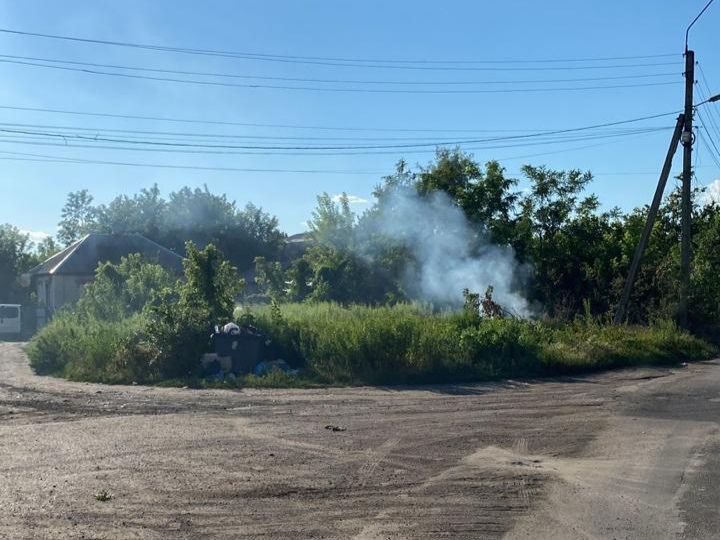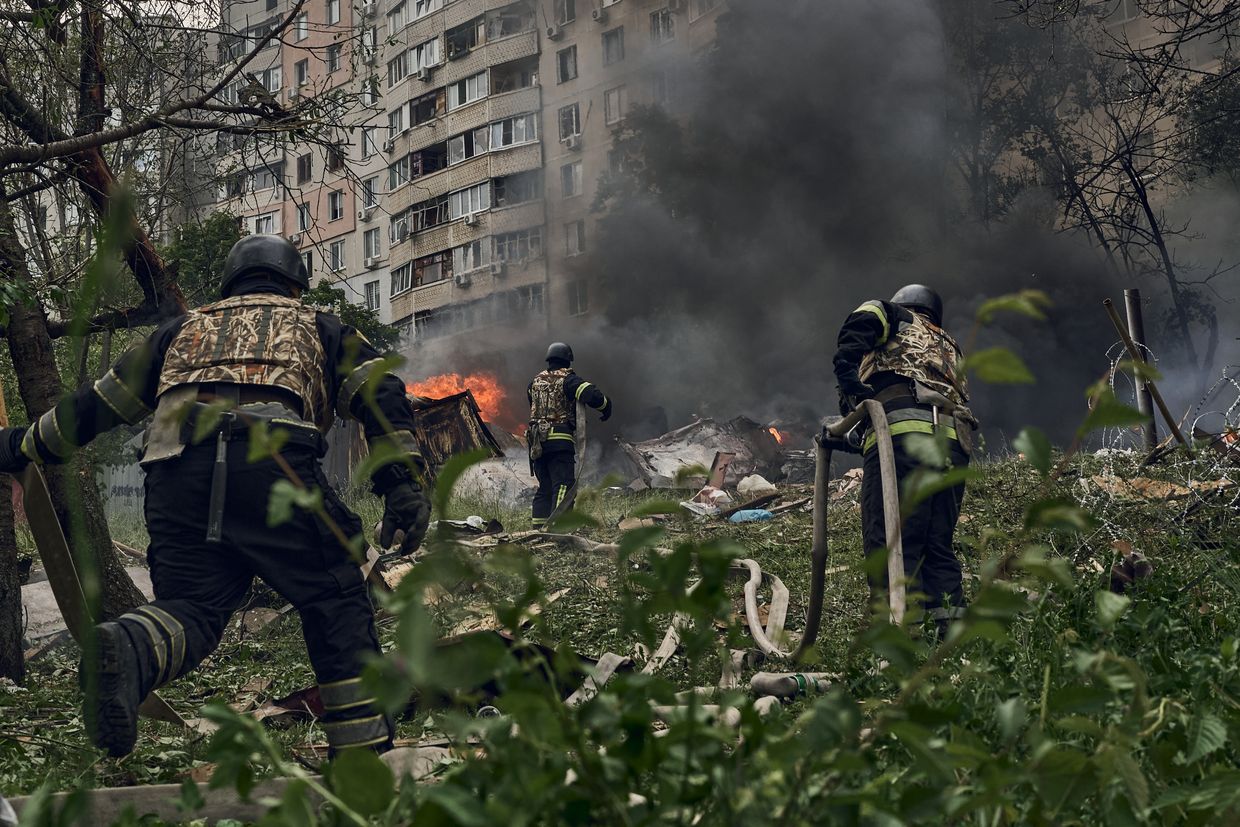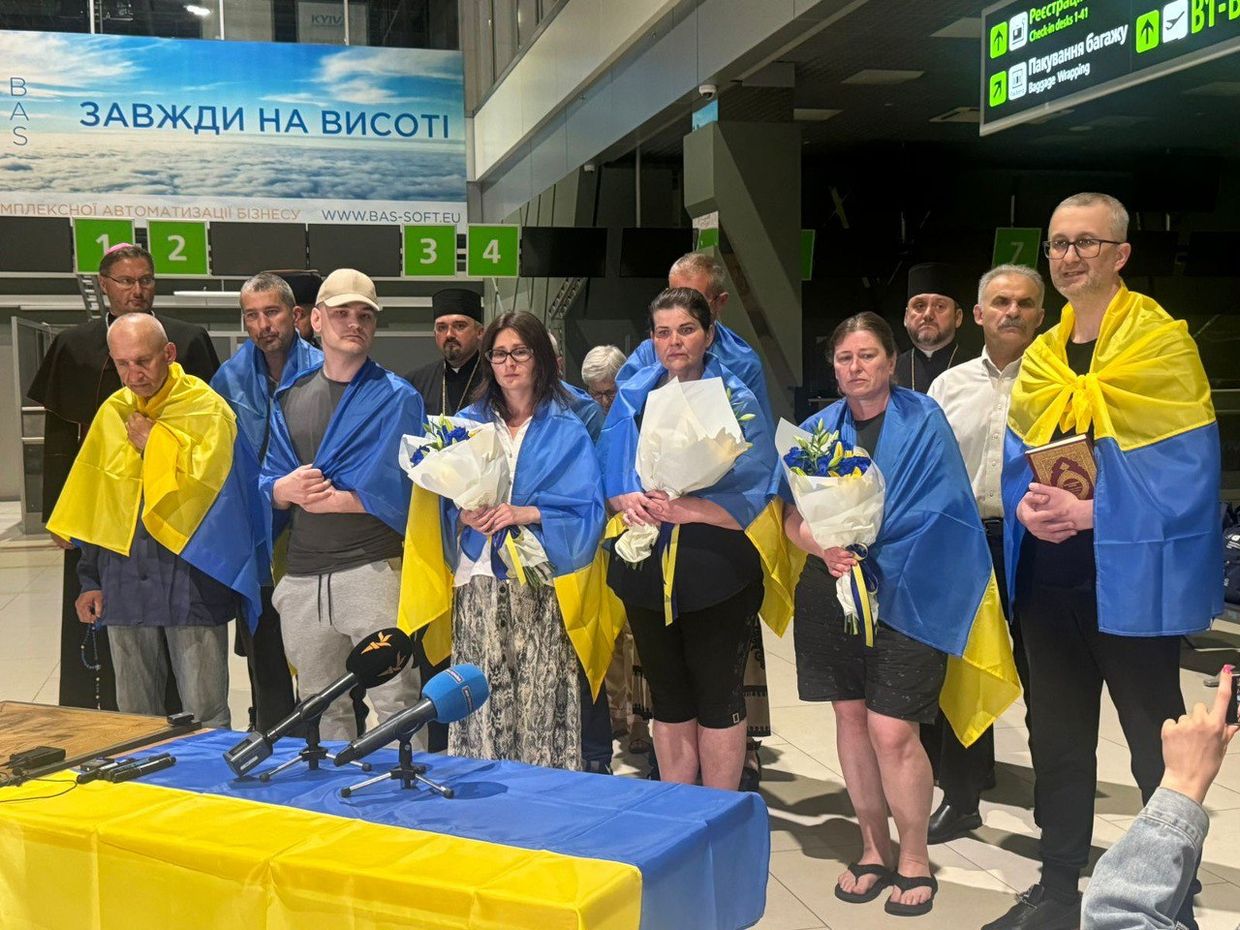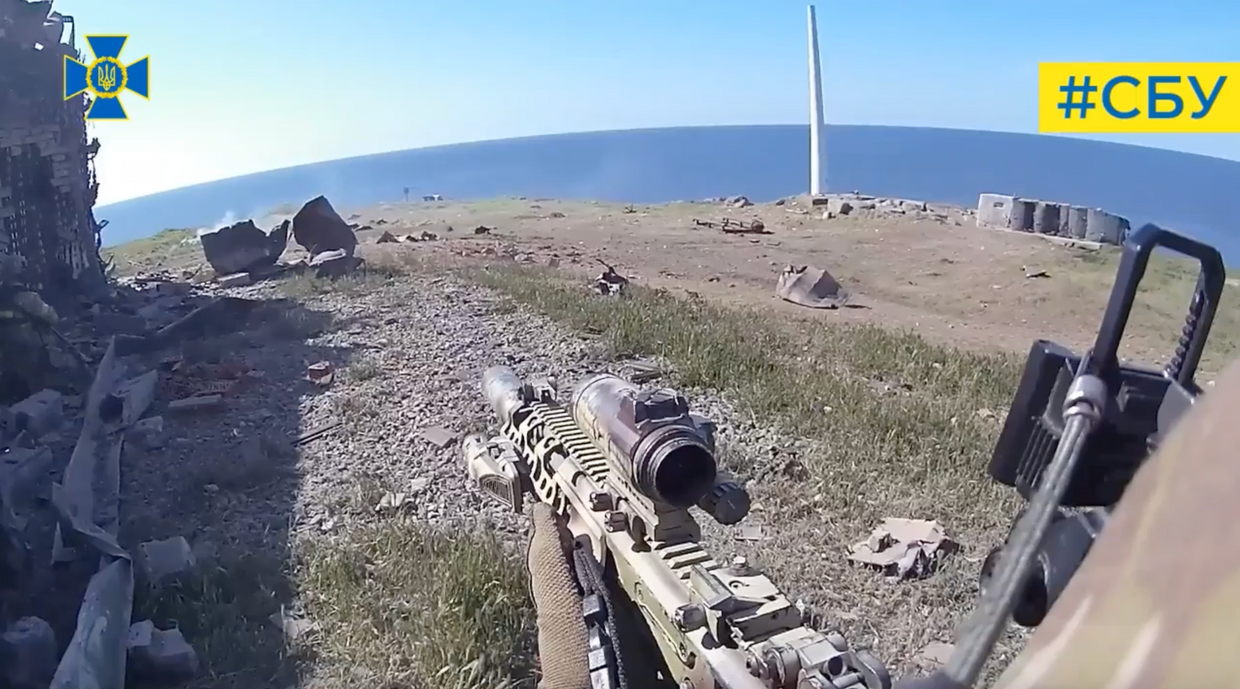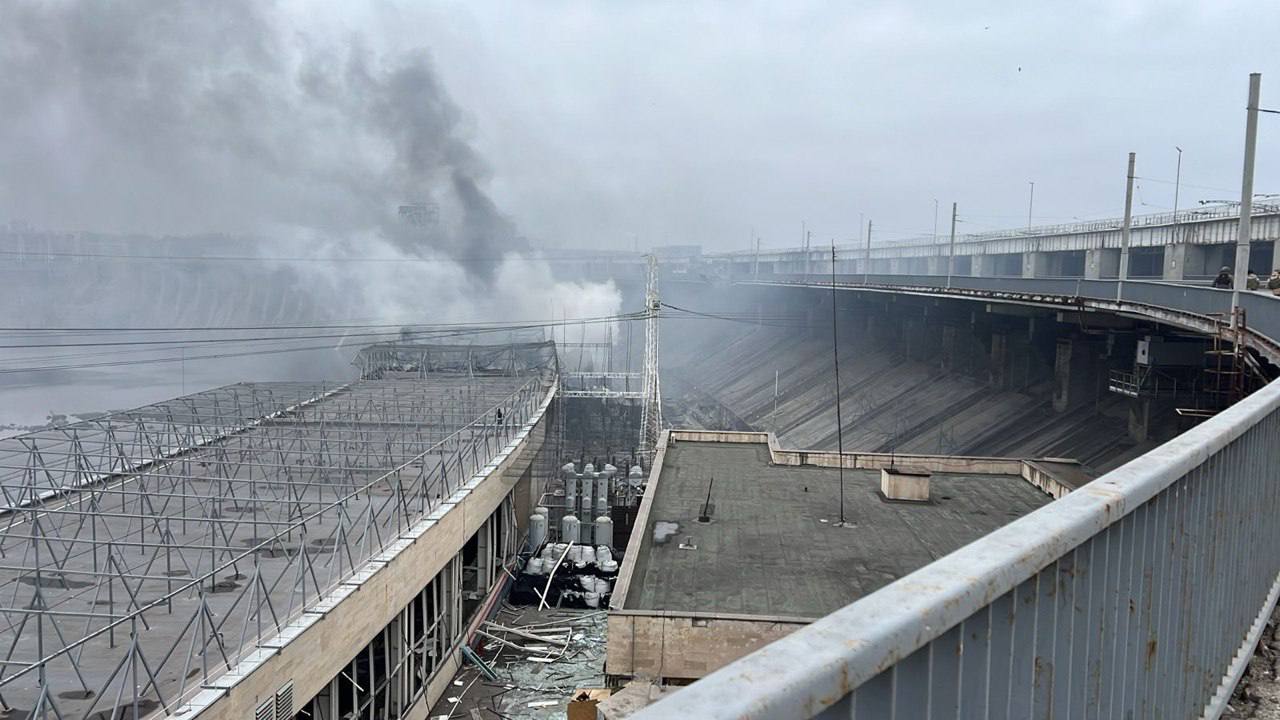Ukraine war latest: Deadly attacks on civilians in Kharkiv, Zaporizhzhia Oblast

Key developments on June 29-30:
- Russian missile attack on Zaporizhzhia Oblast kills 7, including 3 children
- 1 killed, 9 injured in Russian aerial bomb strike on Kharkiv postal depot
- Debris strikes residential building in Kyiv
- Ukraine now mass-producing strike drones with range of over 1,000 kilometers
- Black Sea grain deal provides potential model for talks with Russia, Zelensky says
- Law enforcement agency to investigate general accused of heavy losses, media reports
- 'Tension rises' at border with Belarus, Minsk accuses Kyiv of deploying troops
Russian missile attack on Zaporizhzhia Oblast kills 7, including 3 children
Russian troops attacked the town of Vilniansk in Zaporizhzhia Oblast on June 29, killing seven people, including three children, and injuring 36, local officials said.
Vilniansk, a town with a pre-war population of nearly 15,000, lies around 30 kilometers (18 miles) from the city of Zaporizhzhia and around 50 kilometers (31 miles) from the southern front line.
Several explosions were reported after an air raid alert went off in the region.
Russia launched two missiles at Vilniansk, damaging a critical infrastructure facility, a store, and residential buildings, according to Zaporizhzhia Oblast Police. Commercial premises, houses, and vehicles caught fire after the attack.
"(The attack took place) in broad daylight on a weekend in a place where people were spending their leisure time downtown. Without any military infrastructure," Governor Ivan Fedorov said shortly after the attack.
There were eight children among the injured, the State Emergency Service reported on June 29.
"Our cities and communities suffer from such Russian strikes every day," President Volodymyr Zelensky said.
"There are ways to overcome this—by destroying the terrorists where they are, eliminating Russian missile launchers, hitting them with long-range weapons, and increasing the number of modern air defense systems in Ukraine," Zelensky said.
1 killed, 9 injured in Russian strike on Kharkiv postal depot
Russia targeted a postal depot in Kharkiv with a guided aerial bomb on June 30, killing one person and injuring nine others, among them an 8-month-old child, Kharkiv Oblast Governor Oleh Syniehubov reported at 6 p.m. local time.
Earlier on June 30, President Volodymyr Zelensky said that Russia has used over 800 guided aerial bombs against Ukraine in the past week alone.
According to Syniehubov, the strike killed one employee and destroyed eight vehicles parked outside the depot, which belongs to Nova Poshta, Ukraine's largest privately owned postal service.
"Debris analysis is ongoing. There could have been 9 people at the place of the strike, they are being searched for," Syniehubov added.
Nova Poshta said in a statement on X at 6.30 p.m. local time that the strike had hit near the distribution center, but "all shift workers were in the bomb shelter and were not injured."
"There are victims among the population, as well as truck drivers," Nova Poshta said, adding that the depot was damaged.
Kharkiv Mayor Ihor Terekhov said the strike was "almost in the city center." An explosion was reported in Kharkiv at around 4:30 p.m. local time.
Russia used a missile to strike a Nova Poshta depot in Korotych in Kharkiv Oblast in October 2023, killing eight people and injuring 17.
Debris strikes residential building in Kyiv
A residential apartment building in the northern part of Kyiv was on fire after being struck by debris, Kyiv Mayor Vitali Klitschko said on June 30.
"Debris fell on a residential building in the Obolonsky District of the capital city. There is a fire on the 8th and 9th floors. All emergency services are on site," Klitschko wrote on Telegram at 7:53 p.m.
The fire was contained by 8:25 p.m., Klitschko added in an update.
Two women were being treated for acute stress by medics on the scene, according to the mayor. Of the 14 stories in the building, two floors were partially destroyed and another balcony was also at risk, he said.
About 20 minutes before the strike was reported, Klitschko said that air defense systems were activated and warned residents to remain in shelters. The Air Force reported missiles were headed towards Kyiv.
Videos circulated on social media, showing an apartment block with at least one apartment on fire, and windows shattered on the floors next to it.
Ukraine now mass-producing strike drones with range of over 1,000 kilometers
Ukraine has launched serial production of strike drones with a range of over 1,000 kilometers, the head of state-owned company Ukrainian Defense Industry, also known as Ukroboronprom, said on June 29.
In an interview with ArmyInform, Herman Smetanin said Russia's "huge resources and super-powerful industry" meant Kyiv had to take a more "flexible and inventive" approach to manufacturing weapons.
Ukraine employs long-range drones to strike deep into Russian territory, targeting military infrastructure such as airfields and logistics, as well as oil refineries and depots.
The strikes against oil infrastructure are intended to disrupt fuel supplies to the Russian military and diminish Moscow's export revenues, crucial for funding the war.
Experimental Ukrainian drones have struck targets in Russia as far as the Tatarstan Republic, some 1,200 kilometers (750 miles) away from the Russia-Ukraine border.
Smetanin said that with the help of "private individuals," Ukrainian Defense Industry was now able to "scale production" of long-range drones.
Moscow's defense ministry on June 30 claimed to have destroyed 36 Ukrainian drones overnight that targeted several regions in the southwest of Russia.
In a post on Telegram, it said 15 drones were downed over the Kursk Oblast, nine over Lipetsk Oblast, four over Voronezh Oblast, four over Bryansk Oblast, two over Oryol Oblast and another two over Belgorod Oblast.
The defense ministry did not provide details of any damage or casualties caused.
Ukrainian authorities have not commented. The Kyiv Independent could not verify the claims.
Russian authorities routinely falsely claim to have thwarted Ukrainian drone and missile attacks.
Black Sea grain deal provides potential model for talks with Russia, Zelensky says
Ukraine does not envisage direct negotiations with Russia but could use the model of a tripartite agreement similar to the Black Sea Grain Initiative brokered by the U.N. and Turkey in 2022, President Volodymyr Zelensky said in an interview with the Philadelphia Inquirer published on June 30.
The agreement played a crucial role in mitigating a global surge in food prices partially caused by Russia's full-scale invasion of Ukraine by allowing Kyiv to export its agricultural products via the Black Sea despite the ongoing invasion.
Russia pulled out of the Black Sea Grain Initiative, effectively collapsing the deal, in July 2023.
The deal was the result of tripartite negotiations, where Ukraine signed the agreement with Turkey and the U.N., while Russia signed its own corresponding agreement with the same mediators.
This model could be used for issues like territorial integrity, energy, and shipping, Zelensky said, responding to a question on whether Ukraine could hold direct negotiations with Russia.
Zelensky emphasized that the only possible peace negotiations would be based on Ukraine's peace formula, which calls for Russia to completely withdraw from Ukrainian territory and pay reparations, among other points.
Any other form of peace talks with Russia would not end the war, but encourage further territorial aggression, while "a ceasefire is the best option for the Russians so they can prepare for taking even more," Zelensky said.
"If the idea is to give up our territories, no, it will not solve the issue," Zelensky said.
Switzerland hosted Ukraine's global peace summit on June 15-16, with over 90 countries and organizations in attendance.
Seventy-eight states and four organizations signed the final joint communique of the peace summit on June 16. Nine more states joined the document after the event.
Kyiv is planning to arrange a second global peace summit before the end of 2024.
Law enforcement agency to investigate general accused of heavy losses, media reports
The State Bureau of Investigation will assess Lieutenant General Yurii Sodol's command of Ukrainian troops during the Russian offensive in Kharkiv Oblast, Ukrainska Pravda reported on June 29.
Sodol was the Joint Forces Commander when the new Russian offensive started on May 10. He also headed the Khortytsia group of forces, which operates in Kharkiv and Donetsk oblasts, and was repelling the new wave of assaults there.
The general was dismissed on June 24 after Lieutenant Colonel Bohdan Krotevych, one of the Azov Brigade's commanders, filed an official complaint to the State Bureau of Investigation calling for an investigation of one of the generals.
Krotevych accuses the general of abuse of power and incompetent command of the troops, which led to the loss of Ukraine's territory, as well as personnel.
According to Ukrainska Pravda, the State Bureau of Investigation reviewed Krotevych's complaint and added it to the criminal case about the circumstances of the Russian breakthrough in the border area in Kharkiv Oblast.
The command of the Khortytsia group of forces during the defense operations in Kharkiv Oblast is also being investigated in the criminal case.
The Bureau promised Krotevych that it would check all the circumstances in his complaint, the outlet said.
Krotevych wrote on X that he is "unsatisfied" with the reply from the Bureau.
"Now it's up to the lawyers. I am grateful to everyone who supports us. I ask the military not to be afraid to testify (including non-publicly), we will not back down," he said.
'Tension rises' at border with Belarus, Minsk accuses Kyiv of deploying troops
The Belarusian military claimed that Ukraine is allegedly deploying its forces to the shared state border for potential "sabotage, terrorist acts," state-run news outlet Belta reported on June 29.
The Kyiv Independent couldn't verify the claim, while Belarusian state-run news outlets have a long history of unsubstantiated claims.
"The situation on the Belarus-Ukraine border is characterized by growing tension," Colonel Vadim Lukashevich, a high-ranking Belarusian military official, told Belta.
"They are attempting to drag our country into the war," he added.
Russian forces launched the all-out invasion of Ukraine from Belarus in early 2022 but suffered a defeat near Kyiv and were forced to pull back.
The Belarusian Defense Ministry announced earlier in June that it was beefing up security at the border with Ukraine after a series of "alleged security incidents."
Lukashevich claimed that Ukrainian forces allegedly stationed military equipment, including American-produced ones, in Zhytomyr Oblast, which borders Belarus.
Lukashevich also claimed that Ukraine allegedly set up mines and other explosives near the border with Belarus. Lukashevich believes that this indicates plans of Ukrainian forces for further assault against Belarus, sabotage, and terrorist acts.
Lukashevich didn't provide evidence to back up his claims.
The Ukrainian Security and Defense Council's Center for Countering Disinformation said in May that Russia may opt to conduct a new psychological operation aimed at "stirring up mass panic" in Ukraine.
The plan was to force Kyiv to believe that Belarusian troops would join Russia's war against Ukraine, according to the center.
"We expect a series of provocative statements by the top leadership of Russia and Belarus threatening Ukraine soon," the statement said.
Belarus has been a key ally to Moscow and supported Russian aggression against Ukraine but has not committed its own troops to fight directly in Russia's war.


